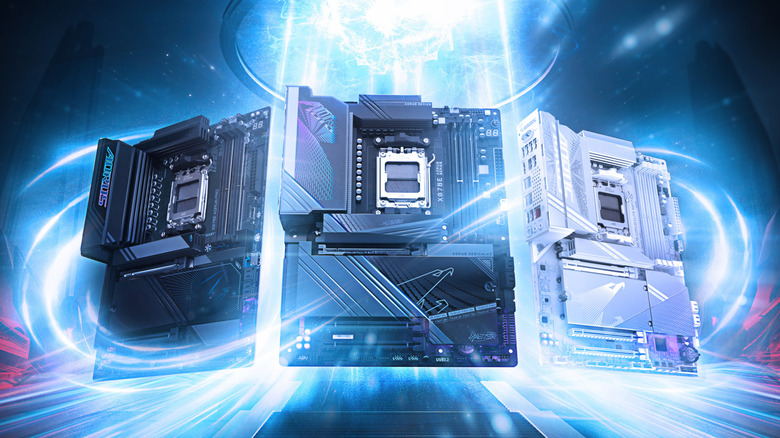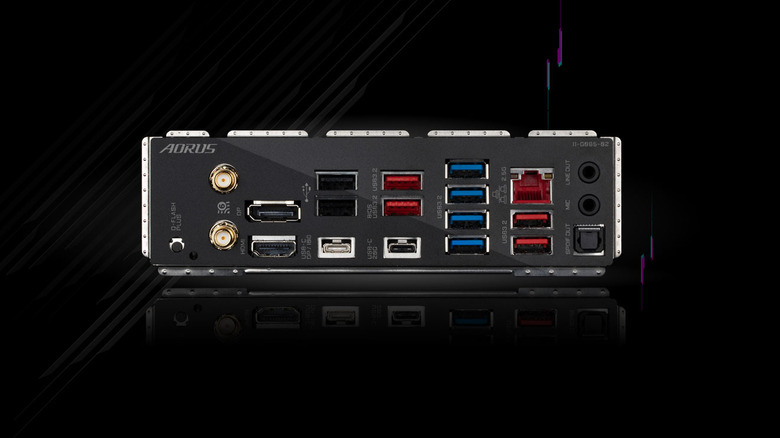MSI Vs. Gigabyte: Which Brand Makes Better Motherboards? (According To Users)
PC builders do love a good brand feud, and MSI vs. Gigabyte is practically the Lakers vs. Celtics of the motherboard world — maybe not as loud as the NVIDIA vs. AMD GPU battle, but just as personal. If you've spent any time on Reddit, PCPartPicker, or your favorite tech YouTuber's discord, you know exactly why. You'll rarely get a straight answer when you ask the internet who makes better motherboards. You'll get opinions — and lots of them. Even after a debate has been settled and a winner has been declared, someone brings up boot speed or some other minutiae just to stir the pot.
Nobody in these threads reports any noticeable performance losses. One builder in r/buildapc, who happened to own both an MSI B650 Tomahawk and a Gigabyte B650 Aorus B650 Elite AX (both AM5 motherboards) summed it up pretty nicely: "Performance-wise they're gonna be pretty much identical. I've had both motherboards and I like MSI's BIOS a little better."
That's the recurring theme here: Performance is almost always a non-starter, but MSI motherboards do carry a small but noticeable lead thanks to a cleaner BIOS and straightforward software. However, the older crowd on Tom's Hardware seems more divided. We dug through users' posts and forums to see what people are actually saying between these two motherboard makers.
MSI's BIOS is better, and a poor Gigabyte user found out the hard way
A recent comment in a candid March 2025 r/PcBuildHelp thread broke it down bluntly: "MSI [BIOS] is leagues better than Gigabyte. Unless there's a really huge price difference, MSI every day. Gigabyte is actually awful on the software side." Even a cynical r/pcmasterrace poster who slags every vendor still admitted, "MSI is probably the better of the bunch. Good BIOS and fairly user-friendly." On Gigabyte motherboards, the latest AM5 firmware has improved, but complaints about slow cursor lag and buried EXPO settings still plague some users.
One poor soul on r/gigabyte, building his first AMD PC (7800X3D on a Gigabyte X670 motherboard) after years on Intel, described it like this: "When I enter the bios itself, everything is extremely laggy ... I move the mouse, mouse trails [at] about 1 second lag before the mouse moves to when it stops moving." Hoping a firmware update might fix things, they opened the BIOS on Windows 11 and fired up Q-Flash, only to be stuck on a screen that read "verifying file" and crawling to 69 % in four hours. At one point, they wrote, "This could be the end folks."
Eventually, Gigabyte support called back and advised a full reset. It's not that Gigabyte can't get there, but as this post (and many others) show, MSI motherboards can handle BIOS better, and since the majority of the crowd is gamers who don't want to wrestle with firmware, MSI tends to be the safer pick for gaming builds like these.
Gigabyte beats MSI in the more for less spec sheet game
MSI has the smoother BIOS, but when spec-chasing builders add up the ports and lanes, they keep landing on Gigabyte's mid-tier Aorus boards. One B850 Aorus Elite owner bragged on r/gigabyte that he's running "the 5070 Ti in the top PCIe slot and per GPU-Z it's in x16 mode and all three NVMe drives are working." Another user with the same motherboard verified, "There is no lane sharing on the b850 Aorus Elite ... I confirmed the 5070 ti is running in x16 mode in GPU-Z."
That kind of unrestricted Gen-5 M.2 layout is rare under $260. Now, to try that on an equivalent MSI MAG Tomahawk, and something has to give — either you drop a drive, or one slot falls back to Gen-4 so the VRMs don't fry your board. It's not just the lanes, as TechPowerUp's review of the same motherboard points out a whopping 10 USB-A ports on the rear I/O and built-in Wi-Fi 7 — features you'd have to jump up to the MPG or the MEG tier on team MSI.
And because Gigabyte fields so many SKUs, open-box bargains are common — Micro Center cleared X670E Aorus Masters for $230 open-box in March, less than half their launch price. If you're stuffing your cart with capture cards or half a dozen SSDs, you don't have to be an expert to know when a bargain is a bargain.


